
Mario Kart: Super Circuit is a 2001 kart racing game for the Game Boy Advance (GBA). It is the third Mario Kart game and retains its predecessors' gameplay: as a Mario franchise character, the player races opponents around tracks based on locales from the Super Mario platform games. Tracks contain obstacles and power-ups that respectively hamper and aid the player's progress. Super Circuit includes various single-player and multiplayer game modes, including a Grand Prix racing mode and a last man standing battle mode.

Dr. Robotnik's Mean Bean Machine is a falling block puzzle game developed by Compile and published by Sega. It was released for the Sega Genesis / Mega Drive in North America and Europe in November 1993, and ported to the Game Gear in 1993 and Master System in 1994.
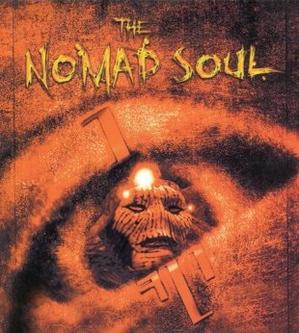
The Nomad Soul is an adventure game developed by Quantic Dream and published by Eidos Interactive. It was released for Microsoft Windows in 1999 and Dreamcast in 2000. The player can engage in unarmed and armed combat, explore the three-dimensional environment of Omikron City, and talk with non-player characters to progress the story. It follows an investigation into a case of serial killings, which unravels the supernatural truth behind the city's ancient history.
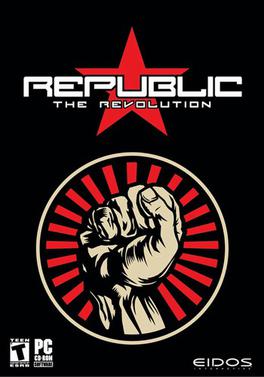
Republic: The Revolution is a video game produced by Elixir Studios and published by Eidos Interactive and for Mac OS X by Feral Interactive. The game is a political simulation in which the player leads a political faction to overthrow the government of a fictional totalitarian country in Eastern Europe, using diplomacy, subterfuge, and violence. Development of Republic was led by Elixir Studios, a company by founder Demis Hassabis, who had previously worked on simulation games for Bullfrog Productions and Lionhead Studios. Design of the game was ambitious, with the game experiencing media hype from Demis Hassabis' descriptions of the game as a highly detailed and realistic simulation of political dynamics. The game experienced several delays, leading to the restriction of the scope of the game's features and scale.

Chris Sawyer's Locomotion is a video game designed and programmed by independent game developer Chris Sawyer, and published by Atari Interactive in September 2004. The game is a simulation game in which the player takes on the role of a transportation company manager, building transportation networks and managing the flow of goods and passengers in order to compete against rival companies. Sawyer independently developed the game over nine years from the 1990s as a "spiritual successor to Transport Tycoon", with the game featuring "fundamentally the same" gameplay but with "differences in detail, scale and presentation" to update and refine the features that Sawyer "wanted to get right" in its predecessor.

RollerCoaster Tycoon 3 is a 2004 construction and management simulation video game. It is the third installment in the RollerCoaster Tycoon series, and was developed by Frontier Developments and published by Atari Interactive. RollerCoaster Tycoon 3 places players in charge of managing amusement parks; rides can be built or demolished, terrain and scenery can be adjusted, and prices can be controlled to keep visitors or "peeps" happy.

RollerCoaster Tycoon 2 is a 2002 construction and management simulation game developed by Chris Sawyer and published by Infogrames Interactive. Released for Windows as the sequel to RollerCoaster Tycoon, the game simulates the management of amusement parks.

Zoo Tycoon is a business simulation game developed by Blue Fang Games and released by Microsoft. Although first released for Microsoft Windows and Macintosh in 2001, it was ported to the Nintendo DS in 2005. It was followed by two expansion packs, Dinosaur Digs and Marine Mania, which were released in 2002, as well as a sequel, Zoo Tycoon 2, released in 2004.

Zoo Tycoon 2 is a business simulation video game developed by Blue Fang Games and published by Microsoft Game Studios and MacSoft. Originally released for Microsoft Windows, Zoo Tycoon 2 is also available for Windows Mobile, PDA, and Mac OS X, although expansions are not included in the Mac version. A Nintendo DS version, titled Zoo Tycoon 2 DS, was released in 2008.
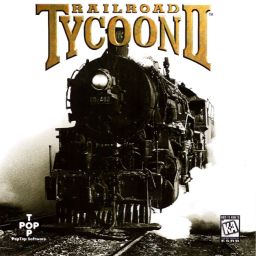
Railroad Tycoon II is a business simulation video game in the Railroad Tycoon series developed by PopTop Software and published by Gathering of Developers. It was released for Microsoft Windows, Mac OS, PlayStation and Dreamcast. It was later ported and released for Linux.

CivCity: Rome is a city building strategy game by Firefly Studios and Firaxis Games. It includes elements from two game series, Caesar and Civilization.
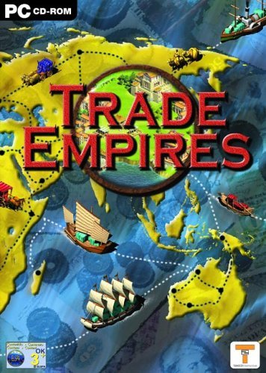
Trade Empires is a pausable real-time strategy game developed by Frog City Software in San Francisco and published by Take-Two Interactive and Eidos Interactive. In the game, players build transportation and trade networks that evolve over the course of centuries as technology develops. It was released on October 20, 2001, for Microsoft Windows. During development its working title was The Silk Road; however, this was changed by Take-Two and Eidos as they were concerned about the title being too highbrow.
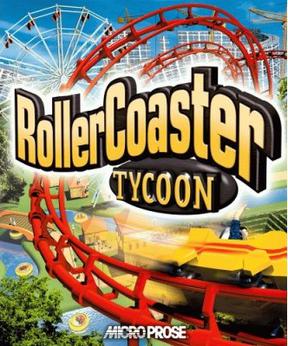
RollerCoaster Tycoon is a 1999 construction and management simulation video game developed by Chris Sawyer and published by Hasbro Interactive. It was released for Windows and was later ported to the Xbox by Frontier Developments in 2003. It is the first game in the RollerCoaster Tycoon series.

Sid Meier's Railroads! is a business simulation game developed by Firaxis Games on the Gamebryo game engine that was released in October 2006 and is the sequel to Railroad Tycoon 3. Although Sid Meier created the original Railroad Tycoon, subsequent versions were developed by PopTop Software. Railroads! was the first game in the series since the original to have direct input from Sid Meier himself. After a visit to Miniatur Wunderland in Hamburg, Germany, Meier was inspired to reinvent his original creation. A version for the Mac OS X was published by Feral Interactive on November 1, 2012, under the latter's Feral Legends label. A mobile version was released in April 2023.

Bionicle Heroes is a 2006 video game published by Eidos Interactive and TT Games Publishing and based on Lego's Bionicle line of constructible action figures. The game was released in November 2006 on PlayStation 2, Xbox 360, GameCube, Microsoft Windows, Game Boy Advance, and Nintendo DS; a Nintendo Wii version was later released in April 2007. The home console and PC versions were developed by Traveller's Tales, while Amaze Entertainment developed the handheld versions. A version of the game for mobile phones, developed by Universomo, was also released. The home console and PC versions of the game are third-person shooters, while the Game Boy Advance version is a run 'n' gun shoot 'em up and the Nintendo DS version is a first-person shooter. The story of Bionicle Heroes, where the player seeks to liberate the island of Voya Nui and its inhabitants from the villainous Piraka, is not canon to the official Bionicle story.
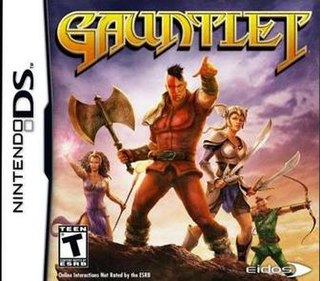
Gauntlet is an unreleased Nintendo DS hack and slash dungeon crawl video game developed by Backbone Entertainment, based on the 1985 arcade game by the same title. The game was originally announced in April 2008, and was scheduled to be released later that year.
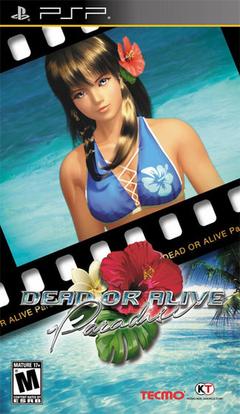
Dead or Alive Paradise is a 2010 video game developed by Project Venus and published by Tecmo Koei for the PlayStation Portable as part of the Dead or Alive series. It is a PSP port of Dead or Alive Xtreme 2 for the Xbox 360, expanding upon the activities available in the original which consisted of mainly beach-related minigames.
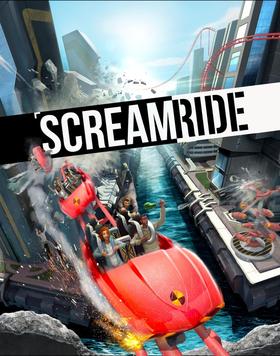
Screamride is a construction simulator and a puzzle video game developed by Frontier Developments and published by Microsoft Studios for the Xbox One and Xbox 360. The game was released worldwide in March 2015.

Planet Coaster is a construction and management simulation video game developed and published by Frontier Developments for Windows. It was released worldwide on 17 November 2016. Frontier had previously worked in the amusement park construction and management genre with RollerCoaster Tycoon 3, Thrillville, Thrillville: Off the Rails, and Zoo Tycoon. A version for PlayStation 4, Xbox One, and Xbox Series X/S, known as Planet Coaster: Console Edition, was released worldwide on 10 November 2020. The PlayStation 5 version was released in North America and Australia on 12 November 2020 and in Europe on 19 November 2020. A macOS version, developed by Aspyr, was later released on 17 November 2020 on both Steam and Mac App Store.
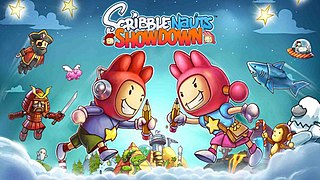
Scribblenauts Showdown is a party game developed by Shiver Entertainment and published by Warner Bros. Interactive Entertainment for the Nintendo Switch, PlayStation 4, and Xbox One in March 2018. The game is the sixth installment in the Scribblenauts franchise, created by 5th Cell. Showdown sees players playing minigames against other players or CPUs.





















